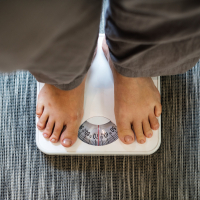
What are the effects of obesity on COVID-19 outcomes?
Key messages
• There is enough evidence to support the finding that extreme obesity (BMI > 40 kg/m2) increases the chance of a person dying, requiring a breathing tube, being hospitalised, and being admitted to the ICU due to COVID-19.
• Obesity in general will result in a person requiring a breathing tube.
• The higher one's BMI gets, the higher the chance that a person will suffer from severe COVID-19 disease.
What is obesity?
Obesity is defined as abnormal or excessive fat accumulation in different parts of the human body and it presents a risk to health. To assess obesity, different indices such as body mass index (BMI) can be used, which is one's weight in kilograms divided by the square of height in metres. The WHO has classified obesity into three classes. According to this classification, class I obesity includes a BMI ranging from 30 to 35 kg/m2, class II from 35 to 40 kg/m2, and class III from 40 kg/m2 and more.
What did we want to find out?
We wanted to find out whether obesity has any effects on mortality, requiring a breathing tube, hospitalisation, ICU admission, severe disease or pneumonia due to COVID-19 disease.
What did we do?
We conducted a systematic search in medical databases for evidence looking at the association of obesity and mortality and other outcomes from December 2019 to April 2021. We then categorised and rated these findings based on our confidence in the evidence, study size, and quality.
What did we find?
We identified 171 eligible studies, with 149 studies (12,045,976 participants) providing quantitative data for at least one of our meta-analyses. In terms of the outcomes, 111 studies reported on mortality, 48 on requiring a breathing tube, 47 on ICU admission, 34 on hospitalisation, 32 on severe COVID-19, six on pneumonia, five on length of hospitalisation, two on length of ICU admission, and one on the duration of the requirement of a breathing tube.
Main results
Our findings indicate that there is a high certainty of evidence that class III obesity is associated with an increased risk of mortality among COVID-19 patients. However, we found that, in mild cases of obesity (classes I and II), this factor might not be independently associated with increased risk of mortality in COVID-19 patients. Similarly, we are very certain that obesity is an independent important factor associated with the risk of requiring a breathing tube in COVID-19 patients. However, the effect estimate sizes were not consistent with a dose-response relationship across increasing obesity classes for ICU admission, hospitalisation, severe COVID-19 disease and pneumonia. To conclude, this review investigated the potential association between obesity and adverse COVID-19 outcomes. We were able to gather evidence from multiple studies and concluded that the association of obesity with mortality and requiring a breathing tube is of high certainty.
What are the limitations of the evidence?
Although BMI is a widely used measurement, the relationship between BMI and body fat is non-linear. Moreover, our review did not discriminate against self-reported and measured BMI. Finally, we were unable to keep up with the rapid pace of publications on COVID-19 despite our best efforts.
How up-to-date is the evidence?
The evidence is up-to-date to April 2021.

